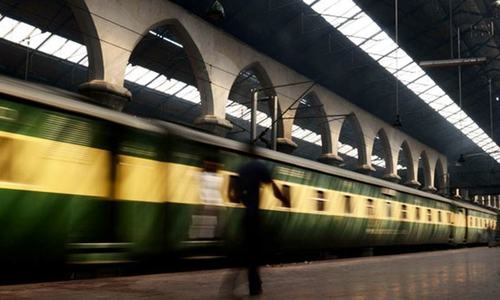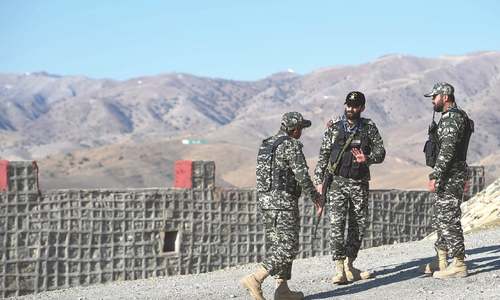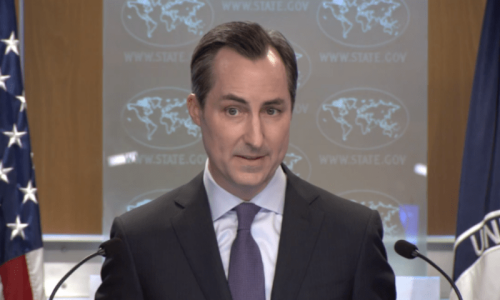
ISLAMABAD: Committing complete fencing of Afghan and Iran borders on priority to ensure peace and security, Pakistan on Tuesday asked China to finance $9 billion Main Railway Line (ML-1) and other road and infrastructure projects to expand the China-Pakistan Economic Corridor (CPEC).
At the conclusion of ninth Joint Cooperation Committee (JCC) meeting of CPEC here, the two sides also approved Gwadar Smart City Master Plan and signed two memorandums of understanding (MoUs) for cooperation in the field of health and trade. They also signed minutes of the meeting and inaugurated 392km Multan-Sukkur Motorway completed with Chinese funding of Rs294bn.
The JCC was co-chaired by Planning Minister Makhdum Khusro Bakhtyar and China’s National Development & Reform Commission (NDRC) Vice Chairman Ning Jizhe. It formed a joint project financing group to formally engage in project financing arrangements on ML-1, said Bakhtyar, adding the groundbreaking ceremony for the multi-billion dollar plan was targeted within the next six months.
He said the government had decided to take ML-1 loan and ensure its repayment because of the limitations of Pakistan Railways. Responding to a question, he said a project loan would not affect the country’s debt-to-GDP situation because it would be completed in about five-six years and contribute also to the GDP size as well.
Responding to another question, Bakhtyar said the two sides also decided to hold discussions on modalities of Chinese financing in Renminbi as it was one of the six major currencies in the International Monetary Fund basket. For this, an expert group at the central bank level and other experts would examine as to how to move forward.
He lamented that CPEC was previously viewed as replacement to Public Sector Development Programme while its true potential lied in the economic expansion and industrial growth for which the new government was setting a fresh direction.
The minister claimed China would also provide Rs70bn financing for Zhob-DI Khan Motorway to connect Islamabad-Quetta through motorway while Pakistan would finance Sukkur-Hyderabad motorway through public-private financing where Chinese would be welcome to participate through open competition.
According to Bakhtyar, security on Pak-Afghan border was a challenge given its 2400km length and its fencing should have been done 10 years ago. He said now it will be completed by 2020 and the same pace would be ensured on the Iran border as well.
“Pakistan’s security situation could not be 100pc in our hands until these borders remain porous. This is the most import security project that would also help achieve law and order and the military and civil authorities have jointly controlled the security situation to a great extent,” he added.
He said the JCC reviewed $12bn of energy sector project portfolio and noted that $4.2bn worth of them had been completed or would be by 2021. It also expressed satisfaction over 6390MW of remaining plans to be finished by 2025 or 2030 keeping in mind Pakistan’s energy plan.
The country was also looking at $8-10bn of investment in refineries, petrochemicals and oil and gas sector in 2-3 projects, the minister said, adding Chinese side was expected to enter the steel that would help reverse Pakistan’s $4bn steel imports.
The two sides also agreed to make progress on mines and mineral sectors, particularly in copper and gold excavation and evacuation where China had great experience and was importing copper from across the world. He said the two sides indicated to expedite completion of social sector development for which China had promised $1bn grant.
Chinese Ambassador Yao Jing said the two countries focused last six years on energy, infrastructure, Gwadar port and this JCC sets a new direction for future projects, mostly in industrial cooperation, agriculture, affordable housing and minerals.
The MoUs signed during the meeting related to All China Federation of Trade Unions (ACFTU) and Ministry of Planning for further strengthening the worker exchanges and healthcare between Ministry of Health and Research Development International (RDI) for testing of cervical cancer.
“We made steady progress in resolution of matters regarding finalisation of tariffs for the completed energy projects, Gwadar port concession agreement and Kohala hydropower project,” said the minister. The chiefs of Balochistan, Khyber Pakhtunkhwa and Gilgit-Baltistan also attended the JCC.
Bakhtyar said the remaining portion of the eastern corridor from Sukkur to Hyderabad (M6) will be completed in build-operate-transfer mode under the umbrella of public private partnership and urged Chinese companies to take active part in the bidding process.
He told the guests that Pakistan had established CPEC Authority to work as a one window for all related issues to enhance the pace of the projects implementatation.
Jizhe said the Chinese delegation to this JCC was the biggest to date which shows commitment to take cooperation with Pakistan to new heights. He stated that high consideration will be given to socioeconomic and industrial cooperation in the second phase of CPEC.
Published in Dawn, November 6th, 2019














































